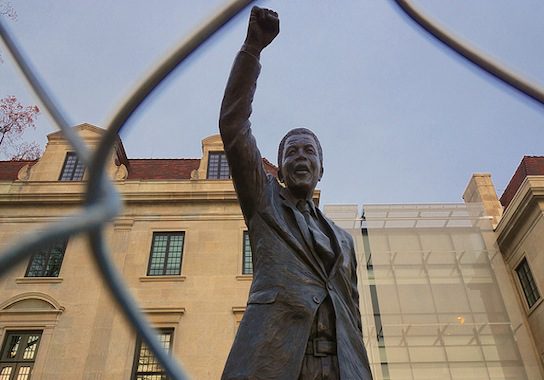Washington and Mandela: Trusting Generations to Come

What if you were to strive after something your entire life, only to meet abuse, mistreatment, and punishment? What if, then, you achieved your great goal in the final chapter of your life–indeed, achieved it on a scale so great, the world swooned at your Cinderella story? Invigorated with fresh victory, perhaps you would leap at every chance to accomplish long-cherished dreams, strive to conquer injustices that had plagued and goaded your history for so long. This is, in many ways, the story of Nelson Mandela.
Unfortunately, as Sondheim taught us, Cinderella stories don’t really end with a simple “happily every after.” Even after experiencing victory for a time, most real-life characters must also stomach the pains of defeat.
One wonders if George Washington felt this way. He wrote his name in the rebels’ declaration, risking life and limb for independence. He dodged bullets in battle, braved winter’s deadness and starvation with weary troops, and bore the pain of multiple defeats. John Richard Green wrote of Washington in his History of the English People,
It was only as the weary fight went on that the colonists learned, little by little, the greatness of their leader—his clear judgment, his calmness in the hour of danger or defeat; the patience with which he waited, the quickness and hardness with which he struck, the lofty and serene sense of duty that never swerved from its task through resentment or jealousy, that never, through war or peace, felt the touch of a meaner ambition; that knew no aim save that of guarding the freedom of his fellow-countrymen; and no personal longing save that of returning to his own fireside when their freedom was secured.
Slowly but finally, victory came. The colonists experienced the sweet taste of victory–but then what? There were still constitutional battles in Congress. Revolt and Jacobin controversy in France spurred similar unrest in the young nation. The War of 1812 loomed on the horizon, and slavery remained a stain on the country’s conscience. The battle was not yet won.
I wouldn’t presume to make an extensive comparison of Mandela and Washington, the two men’s historic and personal contexts differ significantly. But in this sense, that of surrendering the victor’s chair and dealing with a post-Cinderella world, I wonder whether Mandela and Washington could have sympathized with each other.
Rod’s post yesterday on the “Mandela Myth” points out,
…Mandela’s status as a moral icon conceals the terrible realities of post-apartheid South Africa, and how so many of its problems have to do with its culture, and cultural attitudes. The Mandela hagiographies we’re seeing now—did you watch TV news last night?—make it seem that after Mandela left Robben Island prison, South Africa lived happily ever after. This is not true, Ruden says.
Now surely, Mandela was aware of this truth. Even as he took in freedom, political accolades, rugby victory, etc., he knew the battle raged on. His nation still wrestled with historical demons and violence. Though victorious, he and his country had not yet won.
Mandela, like Washington, left his office and (to some extent) the spotlight. These two men, who loved their countries and fought bravely for them, must have felt some weariness in seeing the work left to be done—work that others must accomplish. They were willing to surrender their power, even when political victory and compliments still swirled around them. It is difficult to know when to embrace victory and use it for political advancement—even more difficult to know when one should let it go, when one should humble oneself before the reality of human fallibility and mortality.
Neither Mandela nor Washington acted perfectly. But we can learn from them the politics and prudence required in defeat and victory. In these two men, we see life hopes tied up in a whole nation’s joys and pains. They sacrificed and bled for freedom, sinned and failed but strived for the greater good. They finished their lives without full victory, their work incomplete but left in trust for the coming generations to continue.